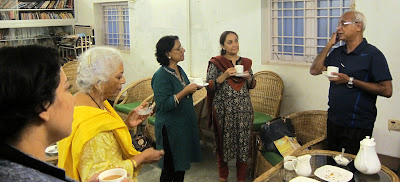The
last reading for the year 2015, a poetry session, was held on December 4.
Though
there were only five members who made it to the reading, eight poets
were read and discussed. Zakia said that the session was unexpectedly vibrant in spite of the curtailed attendance.
Sunil, Priya, Gopa, Zakia, Thommo
Priya
read Afro-American poet Langston Hughes, who has been read before.
She read his most famous poem – The
Negro Speaks Of Rivers,
written when he was just 17. The
others poems she read were – You
and Your Whole Race, feet O’jesus, The City and Park Bench.
An
American poet, novelist, playwright and activist Hughes is credited
for introducing the new literary art form – jazz poetry, as a
leader of the Harlem Renaissance. Hughes homosexuality remained an issue amongst the literati of his time.
Sunil, Priya, Gopa, Zakia, Thommo
Priya
said she read Hughes after meeting a black artist , with the same
name, working at a residence in Vagamon, a hill station located in Kottayam-Idukki border of Idukki district of Kerala. The artist told her that
crimes against the Blacks continued in America as before and that
there had been no respite as generally believed.
Sunil
said that even in Bangalore the African community is treated with
suspicion adding that there is some good reason behind that. They
have often been found guilty of crimes such as drug peddling and
related violence. Gopa said that the AAP government in New
Delhi too had unearthed a drug racket involving Africans.
Sunil
said that an African from a small country in Africa who was training
in Kochi rued the fact that nobody here spoke with him. He felt
lonely and ostracised.
Thommo
narrated about an African who he met during his Kolkata days and that
the man was a helpful character. But after he returned to Nigeria,
which saw violence later, nothing more was heard from him.
Gopa
read four poets who have written about sisters. She said that she has
two sisters and they are close, but lately she was having some
differences with one of her sisters over issues of parenting their
children. She felt it was a good time to select poems that deal with
relationship between sisters. She read My
Sister Laura by
Spike Milligan, Brother
and Sister
By Lewis Caroll, The
Sisters
by Rainer Maria Rilke and One
Sister I have in the House
by Emily Dickinson.
The
mix of poems and poets read by Gopa were widely discussed, especially
Dickinson’s poem about her sister in law and confidante, Sue.
Sunil
read G. K. Chesterton whose wit was once again enjoyed by the group.
The poems were – The
Englishman
and A
Ballad of Abbreviations.
True to Chesterton's ethos, both poems were about true blue Britishness and
about their competitors in the English language, the Americans.
St
George, the patron saint of England was discussed and Sunil said that
the St George Church in Edapally is associated with powerful graces; he has
been saved many times by his faith in Saint George.
Zakia
read the popular 13th Century Iranian Sufi poet Rumi. Jalāl
ad-Dīn Muhammad Rūmī, also known as Jalāl ad-Dīn Muhammad
Balkhī, Mawlānā/Mevlânâ, Mevlevî/Mawlawī, and more popularly
simply as Rumi, was a 13th-century Persian poet, jurist, Islamic
scholar, theologian, and Sufi mystic. Rumi's poems have been widely translated into many of the
world's languages . He has been described as the 'most
popular poet' in the United States, in fact as a 'best selling poet.' Rumi's
works were written mostly in Persian.
Thommo
read D.H. Lawrence’s A
Bad Beginning. The
suggestive circumstances in the poem were discussed animatedly. While
Sunil wondered if there was a reference to a third person in the
poem, Gopa and Priya felt that a husband was giving an ultimatum to
his wife who perhaps had a roving eye? Priya felt that the poem was
written on the morning of what is referred to as the Morning After.
Thommo said that Austria was a landlocked country and hence the sound
of the steamer horn in the poem must be a reference to Europe, or else to a boat on one of the many lakes in Austria.
As
there were few readers the group felt that there was time for
discussing the poem and poet but as all discussions go astray the
group digressed into other subjects.
Everyone
wished each other Merry Christmas and Happy New Year at the close of
the session.
Sunil, Gopa, Zakia, Thommo
Sunil
and Zakia have selected The
Long Road to the Deep North
By Richard Flaganan as their novel for 2016. Thommo and Priya have selected The
Gropes
by Tom Sharpe, Joe and Kum Kum have selected Brideshead
Revisited
by Evelyn Waugh. The other groups have to send in their selections.





































